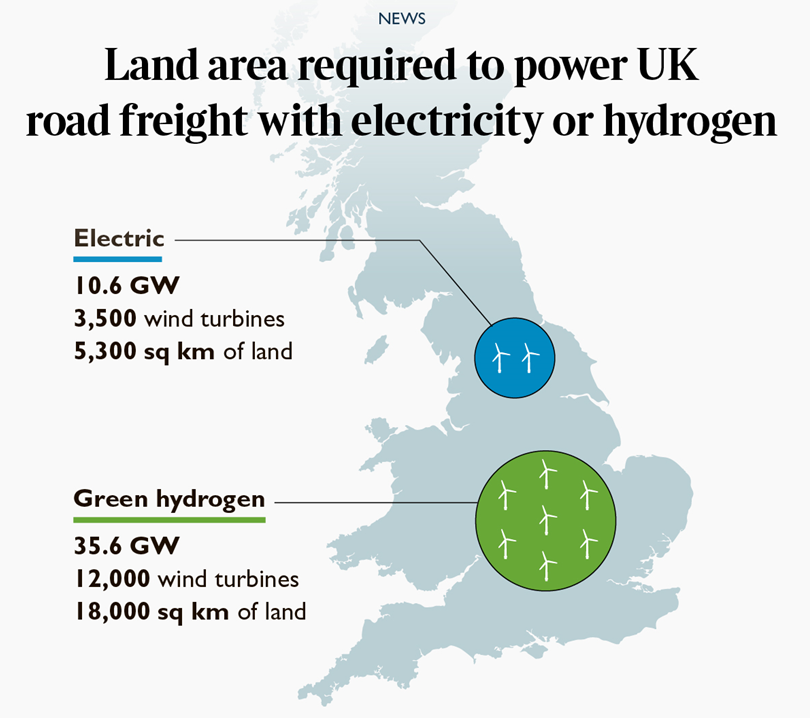Hydrogen Fuelled Heating
In a letter to The Times on 24 September 2020 Professor David Cebon of Cambridge University wrote:
Sir,
There is much hype around hydrogen as the "silver bullet" for the UK's green energy needs for home heating and long-haul transport. Indeed, even the prime minister is reported to be enamoured with this concept ("A hydrogen-fuelled future energises Johnson", James Forsyth, Sep 18, and letters, Sep 19, 21, 22 & 23).
Unfortunately much scientific evidence shows that widespread adoption of hydrogen (instead of electricity) for heating and heavy vehicles would be detrimental to the UK's economy, its energy security and its decarbonisation commitments. A "green hydrogen" solution would consume six times more electricity to heat a house than an electric heat pump. A "blue hydrogen" solution would dramatically increase natural gas imports and/or fracking and would prevent net zero being reached because of fugitive CO2 emissions from the carbon sequestration process. Either hydrogen solution would permanently damage the UK economy.
Given that the fossil fuel industry's preferred blue hydrogen solution would involve significantly increased natural gas consumption, it is not surprising that it is busy lobbying governments around the world for hydrogen. There seems to be no way to reconcile the prime minister's enthusiasm for hydrogen, except to conclude that he and his advisers have been misled by the fossil fuel lobby.
David Cebon
Professor of mechanical engineering, University of Cambridge
This letter prompted Oliver Wright, the Policy Editor of The Times, to write an article the same day:
Fossil fuel companies 'misleading' Boris Johnson on green hydrogen
Boris Johnson is being misled by Britain's multibillion-pound fossil fuel lobby into backing climate change policies that risk unnecessarily pushing up energy bills and undermining carbon targets, leading scientists warn today.
Over the last year dozens of energy supply firms, including Shell and BP, have joined forces to push the government to commit to hydrogen as the key element of its target for the UK to be carbon neutral by 2050.
More than 60 MPs and peers have endorsed the industry's case while the government has appointed the head of Shell in the UK as co-chairman of its hydrogen advisory council. Mr Johnson is reported to believe that hydrogen can be at the forefront of the government's "green revolution", heating homes and powering transport.
The campaign has led to warnings from independent energy experts that Downing Street is falling for "hype" and risks jeopardising the 2050 target while leaving consumers with a multibillion-pound bill to subsidise the changes.
In a letter to The Times today David Cebon, professor of engineering at Cambridge University, said that hydrogen was far from a silver bullet.
"Much scientific evidence shows that widespread adoption of hydrogen (instead of electricity) for heating and heavy vehicles would be detrimental to the UK's economy, its energy security and its decarbonisation commitments," he wrote. "Given that the fossil fuel industry's preferred . . . solution would involve significantly increased natural gas consumption, it is not surprising that it is busy lobbying governments around the world for hydrogen."
The fossil fuel industry is urging the government to utilise the natural gas distribution network to supply hydrogen fuel to homes and businesses. At the same time, they are lobbying for hydrogen to be a key component of the transport network, particularly for buses and long distance freight lorries where electric battery technology is not practical at present.
Experts say, however, that creating truly green hydrogen fuel from water is an incredibly energy intensive and expensive process. They calculate that, using present technology, it would take an onshore wind farm covering 18,000 sq km to produce enough electricity to create green hydrogen to power all the UK's long distance lorries.
In the interim, industry lobbyists argue that the UK could use "blue hydrogen" created from natural gas. This produces carbon dioxide, which supporters of hydrogen suggest could be captured and stored. Critics point out that carbon capture and storage has never been successfully deployed.
Hydrogen gas would also, at present rates, be about twice as expensive as natural gas, leading to higher bills for consumers or taxpayer subsidies.
Richard Lowes, a research fellow at Exeter University's energy policy group, said he was "deeply concerned" that the government might commit to an unproven technology. He said he feared the push for hydrogen was "just a delaying tactic by the gas industry".
A Shell spokesman said: "The UK will need to apply a wide range of technologies to deliver on its net-zero target of 2050, hydrogen included."
GSHPA concerns
The GSHPA notes that the large fossil fuel companies are lobbying the government to pay for research into Carbon Capture and Storage. Some independent advisers are wondering why the oil companies are not putting their own cash into this research. Do the oil companies not have the money? Or do they not believe that Carbon Capture and Storage is an economic technology?
See Fiscal Background: UK energy prices
See Renewable Heating See Renewable Cooling



